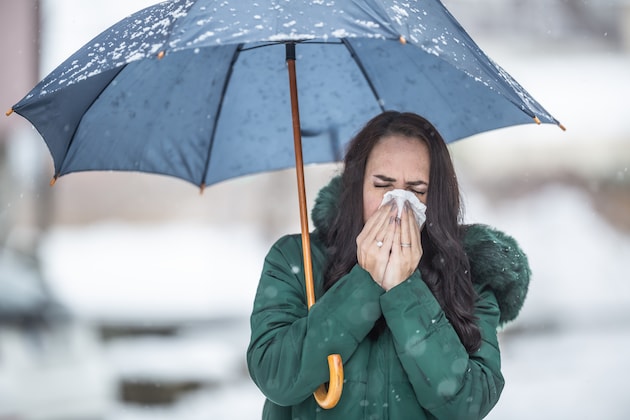For allergy sufferers, sudden weather changes such as heavy rain and thunderstorms can significantly worsen their symptoms. But why exactly do allergy sufferers react so sensitively?
Strong thunderstorms are not uncommon in summer. These not only have an impact on nature, but also on allergy sufferers. Before and during rain or a thunderstorm, the symptoms sometimes become so severe that asthma attacks can result.
Environmental medicine researchers at the University of Maryland have found that asthmatics were more likely to require medical treatment for shortness of breath, particularly after extreme heat periods and thunderstorms. The analysis of hospital data from 115,923 patients between 2000 and 2012 who were treated for severe asthma attacks revealed interesting connections: heat waves and heavy rain in the summer months can mean that asthmatics need medical treatment more often. The reasons for the severe allergy symptoms are varied.
While normal rain cleanses the air of pollen and provides relief for allergy sufferers, thunderstorms and heavy rain increase allergies. Heavy rain leads to a so-called osmotic shock in the pollen grains. They absorb too much moisture, fall to the ground with the rain and then burst open, releasing a high concentration of allergens. If these hit the mucous membranes, which are already irritated during the pollen season, a much more violent reaction occurs.
The solution is very simple: allergy sufferers and asthmatics should avoid going outside for around half an hour during a thunderstorm. You should also keep windows and doors locked first.
If you are surprised by heavy rain or a thunderstorm, you can protect yourself by covering your mouth and nose with a cloth.
However, it should be noted that not all pollen allergy sufferers react equally strongly to thunderstorms and heavy rain. Some people may be more sensitive than others, and the severity of symptoms may vary from person to person. If you suffer from a pollen allergy, it is advisable to speak to a doctor about your specific symptoms and possible treatment options.
The German healthcare system is the second most expensive in the world, but in terms of quality it is only in the middle of the OECD countries. The hospital reform is on hold, but Health Minister Lauterbach is already announcing the next big thing.
Some foods can rob you of sleep. Read here which products you should avoid in order to sleep better at night.
